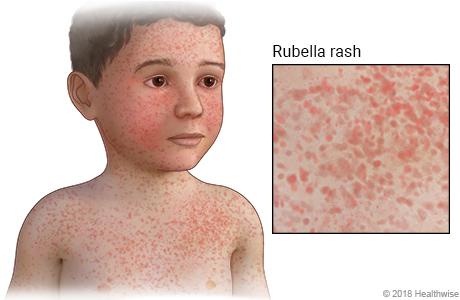Rubella, a German measles can cause red rashes on the body. People also have fever and swollen lymph nodes. The infection spreads from one person to another by the contact of droplets from an infected person who has sneezed or coughed. Thus one can get German measles if they touch the mouth, nose or eyes after touching the droplets of an infected person. It can also be spread by sharing food or drinks from an infected person. It mainly affects the children commonly between 5-9 years of age, but it can also be seen in adults. It usually is cured within one week without treatment . But it can be serious in pregnant women as it causes Congenital Rubella Syndrome. It can create heart abnormalities, deafness and brain damage in the child in the womb.
Symptoms Of German Measles
The symptoms at times are so mild that they are difficult to notice as well. The symptoms usually appear within 2-3 weeks of initial exposure to the virus.
- Pink or red rash on the face which then comes downward to the rest of the body.
- Mild Fever
- Swollen and tender lymph nodes
- Runny or stuffy nose
- Headache
- Muscle Pain
- Red eyes
- Earache
- Stiff neck
Risk Of German Measles
The rubella vaccine is given to children when they are between 12-15 months old, then again between 4-6 years of age. In order to avoid complications, women often need to undergo a blood test to confirm their immunity levels.
But if a woman is detected with rubella in her pregnancy, the virus tends to be passed to the developing baby though the blood stream, known as Congenital Rubella Syndrome. It is a serious matter as it leads to miscarriages and stillbirths. Certain birth effects like delayed growth, intellectual disabilities, heart defects, deafness and poor organ functioning takes place.
Diagnosis Of German Measles
As the German Measles are somewhat similar to other viruses that can causes rashes, the doctor can diagnose only with the help of a blood test. It helps to detect the presence of different types of Rubella antibodies in the blood. These antibodies are the proteins that recognize as well as destroy harmful substances like viruses and bacteria. These tests help to identify whether the virus is currently immune or not.
Treatment
Mostly German Measles are treated by home remedies. However, the doctor shall prescribe Acetaminophen (Tylenol) which can provide relief to fever and aches. One should stay at home in order to prevent from spreading the virus to other people. Pregnant women shall be prescribed Hyperimmune Globulin in order to fight against the virus. But if babies are born with this virus then they may require a treatment that shall be assisted by specialists.
Outlook
Rubella vaccine is usually a combination of the vaccines of measles and chicken pox. The vaccine is not harmful but it could create some adverse effects on the people. But one should not be vaccinated if the immune system is weak or are going through some illness, undergoing pregnancy or planing to become pregnant within the next month.






Comments
Post a Comment